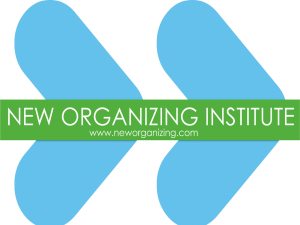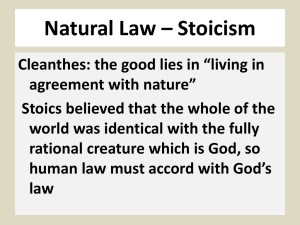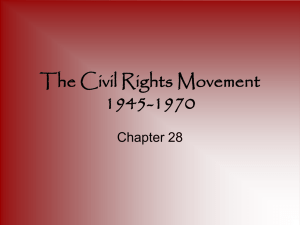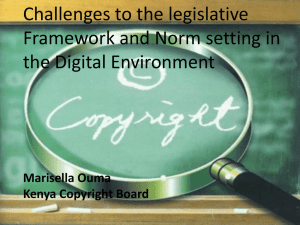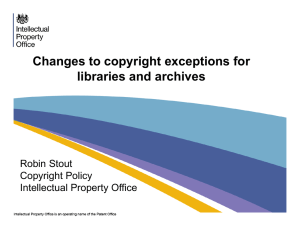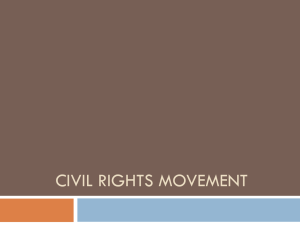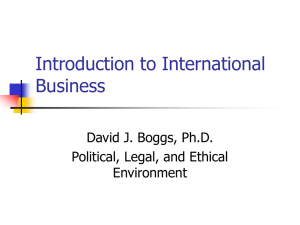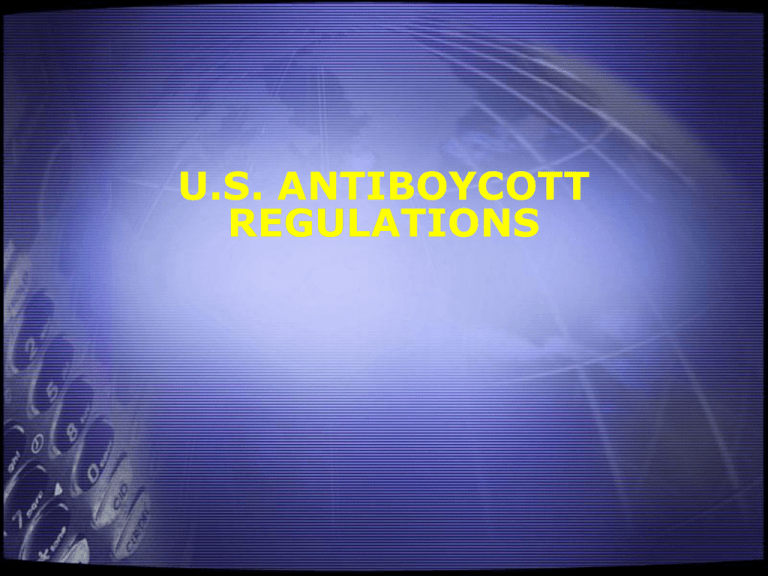
U.S. ANTIBOYCOTT
REGULATIONS
U.S. ANTIBOYCOTT LAWS
• Section 203 of the International
Emergency Economic Powers Act.
Regulations in EAR 760
• Ribicoff Amendment to the Tax
Reform Act of 1976 Section 999 of
the Internal Revenue Code
2
WHAT KIND OF BOYCOTT?
Primary: Restricts imports from
boycotted country
*Secondary: Restricts trade with firms
dealing with boycotted country
*Tertiary: Restricts trade with firms
dealing with blacklisted persons
“*”--Jurisdiction of Antiboycott Rules
3
HOW TO ANALYZE AN
ANTIBOYCOTT ISSUE
Jurisdiction: U.S. persons and U.S.
commerce?
Prohibitions: Is conduct illegal?
Exceptions: Is conduct excepted from
prohibitions?
Reporting: Is there a boycott
request?
4
JURISDICTION
An activity is subject to the
jurisdiction of the antiboycott
regulations if it involves a “U.S.
person” and “U.S. commerce.”
5
U.S. ANTIBOYCOTT
REGULATIONS
Prohibitions
& Exceptions
6
PROHIBITIONS
• Agreements to refuse, or actual refusal
to do business, with or in Israel
• Agreements to refuse, or actual refusal
to do business with companies the Arab
League has blacklisted
7
PROHIBITIONS
• Agreements to furnish or actual
furnishing of information about
business relationships with or in Israel
• Agreements to furnish information
about business relationships with Arab
League blacklisted companies
• Furnishing of business information
8
PROHIBITIONS
• Implementing letters of credit
containing prohibited boycott terms
or conditions
• Other Prohibitions:
– Discriminating or agreeing to
discriminate based on race, religion,
sex, national origin or nationality
– Furnishing or agreeing to furnish
information about the above
9
PROHIBITIONS
Information Concerning Association
with Charitable and Fraternal
Organizations
– Furnishing information about
charitable or fraternal
organizations
– No exceptions
10
EXCEPTIONS
Compliance with Import
Requirements of a Boycotting
Country
Examples:
– Exports to boycotted country,
directly or indirectly
– Route of shipment of exports to
or through boycotted country
11
EXCEPTIONS
Compliance with Shipping
Document Requirements of
Boycotting Country
– Positive Requests
– Examples:
• Country of Origin
• Name of Carrier
• Name of Supplier or
Service Provider
12
EXCEPTIONS
Compliance with Unilateral and
Specific Selection
– “Necessary and Customary”
– Goods specifically identifiable
– Applies to “Pre-selection” and
“Pre-award” services
13
EXCEPTIONS
Compliance with Local Laws:
– Applies to “laws,” not “policies”
– Applies to U.S. persons that are
resident in a foreign country
– Includes entering into contracts,
employing host country residents,
purchasing and selling host
country goods, furnishing
information
14
ANTIBOYCOTT
REPORTING
REQUIREMENTS
REPORTING REQUIREMENTS
• Reports required quarterly
• U.S. person must report receipt of request
to take action that furthers boycott even if
they did not act on it
• Must relate to transaction of anticipated
business in U.S. Commerce
• Includes overseas subsidiaries that are
controlled “in fact” by the U.S. parent
16
EXCEPTIONS TO
REPORTING REQUIREMENT
•
•
•
•
Route of vessel
Use of specified country’s vessel
Positive certification of origin
Compliance with country’s laws if
boycott laws not mentioned
• Certificates of vessel eligibility
17
ENFORCEMENT
Criminal:
– Each "knowing" violation up to
$50,000 or five times the value
of the exports involved,
whichever is greater
– Imprisonment of up to five years
18
WHERE COMPANIES GO
WRONG
• Only check targeted countries
• Do not train their subsidiaries to report
19
ENFORCEMENT
Administrative:
– General denial of export
privileges
– Fines of up to $11,000 per
violation
– Exclusion from practice
20
Penalties imposed for each
"knowing" violation
• fine of up to $50,000 or 5 times the
value of the exports involved,
whichever is greater, and
imprisonment of up to five years.
21
During Fiscal Year 2007
• 10 companies paid civil penalties totaling $194,500
to settle allegations they violated the antiboycott
provisions of the EAR. Most of the settlements
involved alleged violations of the prohibition against
furnishing information about business relationships
with or in Israel, or with companies on boycotting
countries’ blacklists. Other settlements involved
failure to report receipt of requests to engage in
restrictive trade practices or boycotts.
22
• In Fiscal Year 2007, BIS’s Office of Antiboycott
Compliance responded to 1,097 requests from
companies for guidance on compliance with the
antiboycott regulations. During the same period,
BIS officials made 16 public presentations on the
antiboycott regulations to exporters, manufacturers,
financial services institutions, freight forwarders,
and attorneys involved in international trade. BIS
also provided extensive counseling to individual
companies with specific boycott problems.
23
SUMMARY
• U.S. Antiboycott laws
• How to analyze your antiboycott
problem
• Exceptions and Prohibitions
• Reporting requirements
• Enforcement
QUESTIONS?
24


